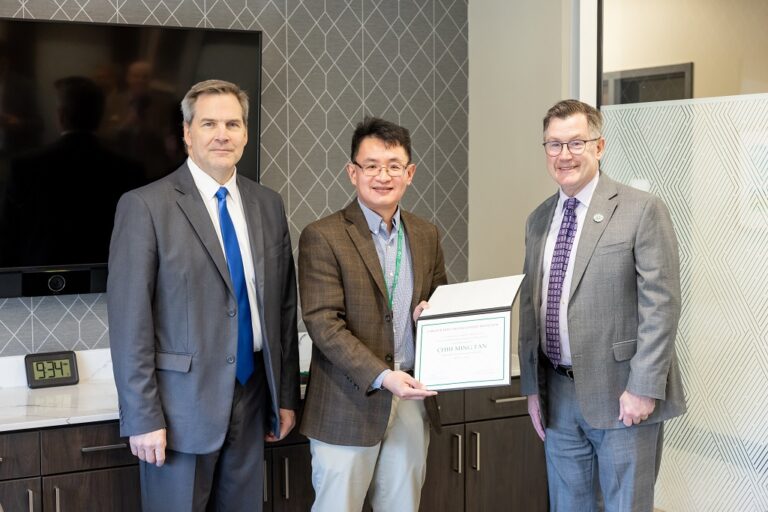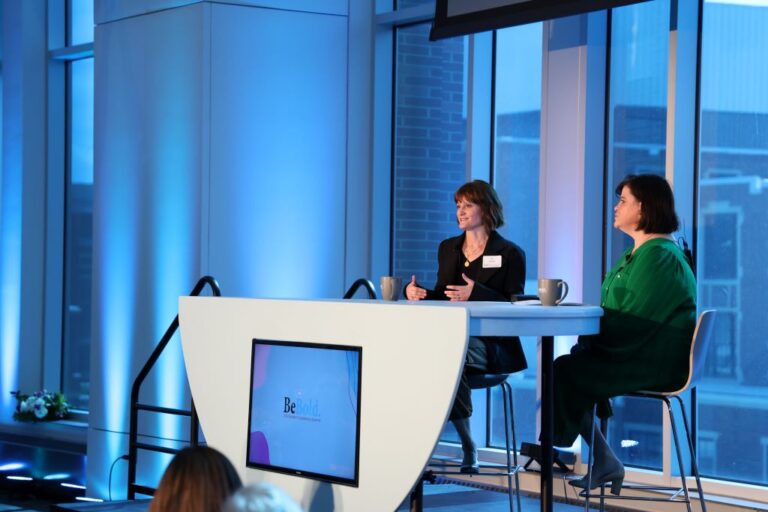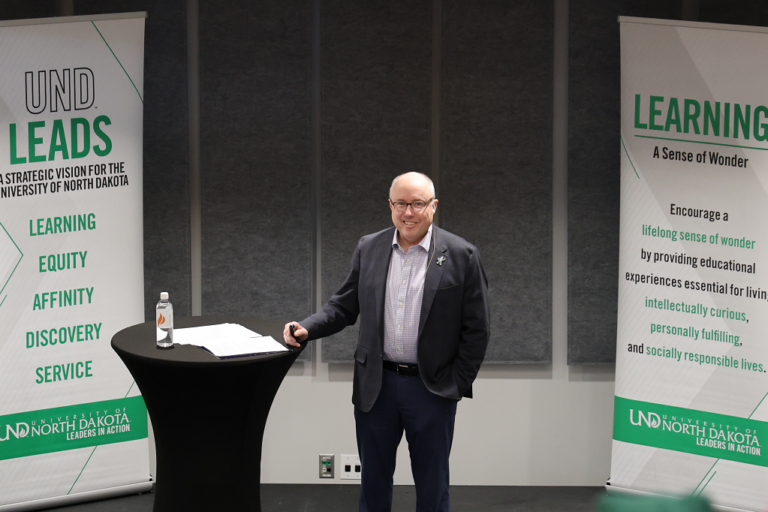Standing out in a ‘sea of sameness’
UND Marketing collaborates with academic chairs to determine what makes their programs worth crowing about

College degree seekers have a tough decision to make.
What school, of the thousands across the globe, rises above the rest? What program best fits my unique needs? What experience will set me apart in the workforce?
The University of North Dakota knows the answers – and it’s bringing its marketing team and academic leaders together to communicate why UND should top every prospective student’s list.
“It’s a highly competitive environment out there,” UND President Mark Kennedy told the dozens gathered at the UND Chairs Leadership Institute on Jan. 24. “We want to win. We need to make sure that we are positioning ourselves to do so.”
This regular monthly assembly of department chairs carried a recruitment twist, as members of UND Marketing & Creative Services and Admissions sat among the ranks.
“The main goal of this meeting is to get everyone honed in on what a key selling point is for your area,” said Assistant Marketing Director Tera Buckley. “We need your help in finding out what that is.”
Differentiation will be key in how UND leverages its partnership with BarkleyREI, who is assisting with a robust digital advertising campaign – part of a $3 million investment in marketing designated in Goal 3 of the One UND Strategic Plan.
“All of the information we can gather from you really helps us make a better case,” said Chris Herring, director of digital marketing for BarkleyREI, further explaining that the right imagery, language and data points can make or break recruitment success. “It’s important for you to consider what differentiates your program, what are those key action items that we can put into advertising so we can drive better, more qualified applicants to UND.”
Rules of differentiation
President Kennedy, having a deep CV of business and political experience, knows a few things about selling an idea. In a fast-paced presentation, he laid out how UND and its programs can escape the “sea of sameness.”
“We need to be very sharp at defining what we do and how we do it and how we communicate it to the world,” he said.
There are several rules to follow when determining key selling points for a program, Kennedy explained. The first is straightforward – don’t use a three-digit number as a sellable ranking (e.g. 278th best in the U.S.).
One also has to choose selling “cost” or “quality” – it’s difficult to market both. According to Kennedy, “You can be Wal-mart, or you can be Louis Vuitton,” and to maintain message consistency across programs, UND should lean into its vision of being the Premier Flagship University of the Northern Plains. “Premier equals quality,” he said.
The President also reinforced the importance of becoming harmonious in the use of the University brand message of Leaders in Action, stressing, “You’ll be hooking into an engine that’s already going down the road with some energy.”
It’s critical, Kennedy continued, to remember that the public and academia are oftentimes disconnected and tend to speak in different ways. He said it’s less about what UND offers and more about how it communicates what UND offers – in language that students care about.
“When you say one of your three selling points is that you’re one of 786 accredited programs, I’m going to say … do students and parents even know what accreditation really means?” the President asked. “They want to ultimately talk about jobs. Think about how you can relate to them and their employment situation, and sell the benefits.”
Students are drawn to programs and classes that spark their specific interests and career goals, Kennedy said, and UND has an opportunity to provide those more niche experiences. He added that we’re living in an “experience economy,” and that students want choices beyond fulfilling endless core program requirements.
“If you ask [a student] who their favorite professor was, it’s typically in an elective that specifically aligned to their interest,” Kennedy said, explaining that UND must showcase its high-impact programs that deliver stimulating lectures, diverse group discussion, and opportunities for interest-based research and studies abroad.
“I truly believe that if we embrace these ideas, it will mean good things for each of your programs and each of your departments,” he said in closing.

Landing the sale
Following the presidential pep talk, the chairs held roundtable brainstorming sessions guided by a marketing or admissions representative. Discussions encompassed the importance of using data for verifiable proof points, identifying distinctive student interests, and what’s important to today’s 16-year-olds and graduate program prospects.
“It’s always good to see what perspectives other people have and how they’re trying to articulate these things in their departments,” said English Department Chair Eric Wolfe, who added it’s sometimes challenging to differentiate oneself in a traditional discipline like English. “We need to think carefully about what our specific strengths are here.”
“It’s no longer a matter of, ‘If you build it, they will come,’” Associate Marketing Director Jennifer Swangler said. “We really have to start telling our story, and the best way for us to tell our story is through the people who know these programs the best.”
UND Provost Tom DiLorenzo said this Chairs Leadership session was among the most motivating he’s experienced. “It was a perfect combination of a consultant’s expertise providing context, the President’s extensive background providing direction, and Marketing’s ability to create a compelling message,” he said.
The chairs will bring these ideas back to their departments to fine-tune their selling points, and the marketing team will use those selling points for digital ad campaigns, more enticing website information and better follow-up communications.
“The President helped set the stage today,” Swangler said. “It lays the groundwork for marketing, and gets the wheels turning in these departments about what’s really important.”


